Are you wondering how to get a business credit card that meets your company’s unique needs? With so many options out there, it can be challenging to determine which card is right for your goals and business expenditures.
But don’t worry. Our credit card experts at Businness2Community are here to help.
With our extensive expertise in the world of business credit, we will walk you through everything you need to know about getting a business credit card, from understanding the different types of cards and their features to figuring out the ideal card based on your spending habits and business profile and the application process.
Key Takeaways: How to Get a Business Credit Card
- Understanding Needs: Identifying the specific needs and uses for a business credit card is critical to choosing the right one for your company.
- Credit Check and Options: Checking personal credit scores and comparing card features, like rewards programs and interest rates, are vital steps.
- Application Process: Gathering detailed business and personal information is necessary to smoothly navigate the application process for a business credit card.
- Strategic Benefits: Business credit cards offer several strategic advantages such as building credit history, managing cash flow, and leveraging rewards for business expenses.
How to Get a Business Credit Card In 5 Simple Steps
If you have already decided that you need a business credit card, you can follow these simple five steps to apply for one.
Step 1: Decide What You Need a Business Credit Card For
Before applying for a business credit card, determine your motivation for getting one and whether you really need one. Write down everything you may want to use it for to help judge if it’s worth it.
Who Can Benefit From a Business Credit Card?
Small business owners often benefit from having a business credit card, even when their business doesn’t bring in much revenue yet.
Business credit cards are especially powerful in the early stages of businesses when expenses are high and revenue is still building. They provide the flexibility to purchase inventory, equipment, marketing services, software subscriptions, and more while managing cash flow efficiently at the same time.
The common thread is that any type of business with regular purchases can benefit from obtaining a business credit card, especially when their largest expenses have to be paid upfront. Getting a business credit card early on is often recommended because it helps build your business’ credit history and keeping finances separate from personal spending is incredibly important for taxes.
Nevertheless, it’s important to remember that credit cards aren’t always the best solutions for every funding problem you run into. Small business loans often have much lower interest rates than business credit cards so if you can’t pay off the balance on time, a loan may be the better choice.
Always be aware of potential costs like interest charges (if you will be carrying a balance) and annual fees.
Step 2: Check Your Personal Credit Score
Every business credit card issuer will check your personal credit history when reviewing your application. Check your FICO credit score from a site like Credit Karma before applying. ‘Good’ scores are 670-739. If your score is on the low end, below 580 or so (sometimes higher), look into secured cards that require a deposit (collateral).
Step 3: Research Credit Card Features
Compare business cards and their features like rewards programs, points systems, and cash-back offers. Pick a credit card that matches your spending needs.
Frequent travelers may want airline miles while those that will be used for general business expenses may opt for those that offer the best cash-back rewards. Also look for extra perks like insurance, upgrades, and warranty extensions.
If you aren’t sure which business credit card you want yet, scroll down to the next sections to gather more information to learn about the many different types of business cards.
Step 4: Gather Business Information
Collect the required business and personal info to apply, including your business’s legal name, address, tax ID number, structure, revenue, tax records, years in business, your role, and your employer identification number (EIN).
‘Also have your personal contact details, income, Social Security number (SSN), and date of birth at hand to share during the application process. The personal credit score of the business owner is necessary because most small business credit card companies require a personal guarantee.
Note that you don’t necessarily need an employer identification number to get a business card but a SSN is almost always required for small business credit cards.
Step 5: Submit Your Business Credit Card Application
Once you have this information at hand, complete the business credit card application through the issuer’s website, by phone, or by email. Provide accurate details. You may get an instant decision or have to wait a few weeks to get a decision.
If accepted, your new credit card should arrive within 7 to 14 days after the approval notice is sent. Once you receive the business credit card, make sure to follow our best practices for business credit below to build business credit just like you build personal credit.
If you want to dive into even greater detail on the application process, check out Daniel Braun’s video on the subject.
Key Business Credit Card Features to Compare
Getting a business credit card tailored to your company’s needs can provide flexibility, rewards, and valuable benefits. Now we are going to walk you through how to compare business credit cards. When choosing which business credit card is right for you, keep these key factors in mind:
Rewards Programs
- Analyze your spending to identify frequent categories like travel, shipping, dining, gas, office supplies, etc.
- Compare cards that offer bonuses in those categories through cashback, points, or miles. Tiered rewards cards earn more in select categories while flat-rate cards provide one rate across all purchases.
Interest Rates & Fees
- Cards with annual fees often provide premium rewards and benefits. Evaluate whether the annual fee will be offset by your estimated earnings.
- Check interest rates and introductory APR offers. Low intro rates help finance large purchases over time. Ongoing lower rates reduce interest costs if the card is carrying a balance.
- Consider special financing options like 0% intro APR periods for 12-15 months on new purchases.
Fit For Your Business
- Match the card’s benefits and offerings to your actual business needs and expenses. Avoid paying for perks you won’t use.
- Understand card use restrictions. Some business credit cards prohibit certain business types or don’t allow international transactions, for example.
- Ensure you can meet application requirements like years in business, revenue, and personal credit score eligibility.
- Consider both your short and long-term business goals and choose a business credit card that can evolve along with your company over time.
With the right business credit card, you can seamlessly separate expenses, track spending, build business credit, access flexible financing, maximize rewards, and gain valuable benefits tailored to your business. Analyze your spending habits, credit needs, and budget to narrow down the best option.
Also read: Business Loans vs. Line of Credit: A Detailed Entrepreneurial Guide
Types of Business Credit Cards
Financial institutions offer different types of the best business credit cards. Each of these instruments has its own benefits and perks that make them attractive choices for specific types of businesses. In this section, we provide an overview of the most common types of business credit cards.
Cashback Cards
A cashback business credit card offers a cashback reward on eligible purchases expressed as a percentage of the total purchase. The percentage typically ranges from 1% to 5%. Some providers offer higher rates in certain categories like office supplies, gas, or restaurants.
- Pros: Easy to earn and redeem rewards, benefits different types of businesses.
- Cons: Lower earnings rates compared to a rewards credit card.
- Good for: Service businesses, retailers, and restaurants.
The Chase Ink Business Cash Card is an incredibly popular cashback business credit card.
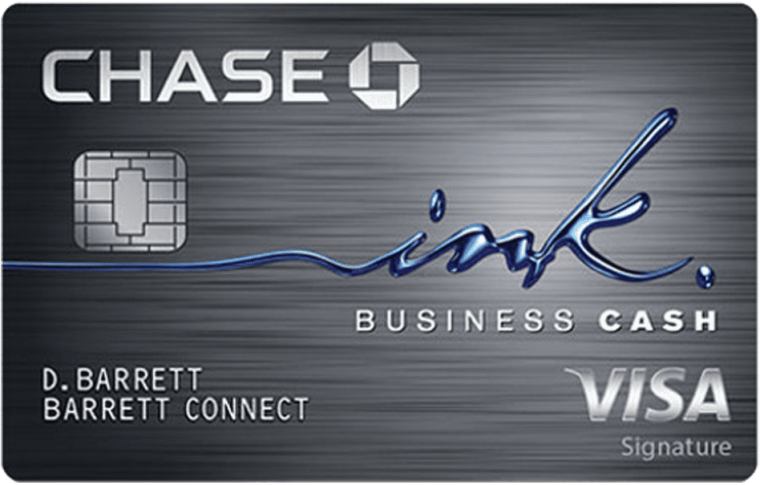
Travel Rewards Cards
Travel rewards cards are ideal for frequent business travelers, these cards earn points or miles that can be redeemed for flights, hotels, rental cars, and more.
- Pros: Lucrative rewards for travelers. Airport lounge access and travel protections may be included.
- Cons: Annual fees are common. Benefits are limited if you don’t travel often.
- Good for: Consultants, field sales, and executive teams.
One of the most popular options is the Chase Ink Business Preferred® Credit Card pictured below.
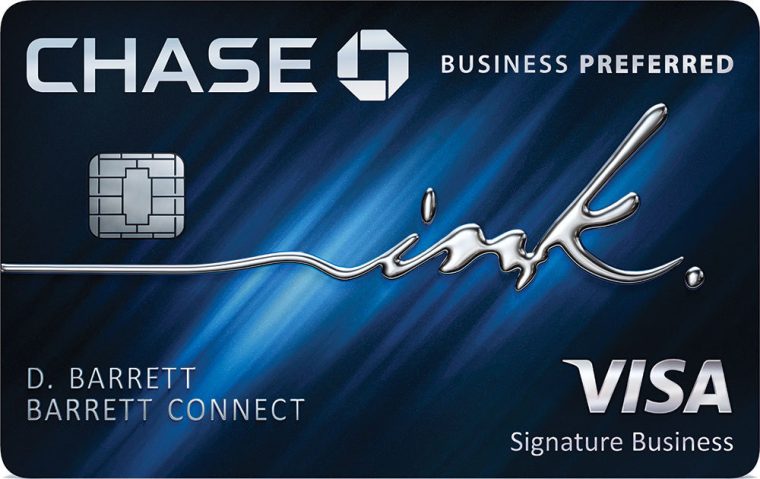
0% Intro APR Cards
These cards provide a 0% introductory interest rate for a set period typically ranging from 12 to 15 months. They provide financing for large purchases over time without accruing interest initially.
- Pros: Useful for major startup costs or equipment purchases when cash flow is tight.
- Cons: Interest rates typically spike after the intro period ends. Balance transfer fees may apply.
- Good for: New businesses, contractors, and retailers.
American Express’ Blue Business® Plus Credit Card is a top 0% intro APR card, especially for small business owners.
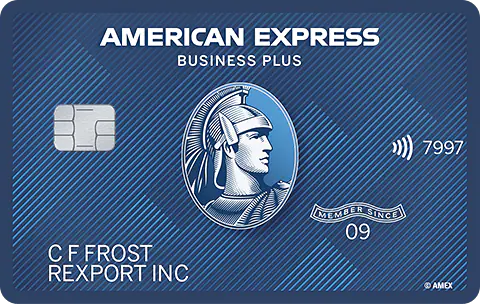
Business Rewards Cards
Business rewards cards offer accelerated earn rates on bonus business spending categories like shipping, internet services, hardware, and more. Credit can be redeemed for cash, airline miles, or merchandise.
- Pros: Maximizes rewards on common business purchases. Some of their perks include employee cards and travel protections.
- Cons: Annual fees usually apply.
- Good for: Retailers, restaurants, and professional services.
The Brex 30 Card is a popular business reward card for businesses that pay for rideshare and software often because it offers 7x and 2x points for these types of purchases respectively.
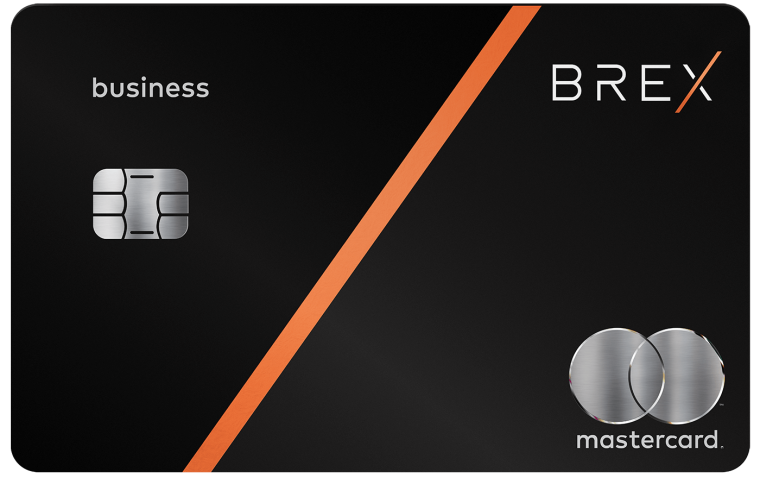
Charge Cards
Charge cards don’t have a preset spending limit but must be paid in full each month. The purchase limit is approved based on your payment history and creditworthiness.
- Pros: Flexibility and prestige. Useful for businesses with irregular large purchases.
- Cons: Risk of overspending. Mandatory full monthly payments.
- Good for: Well-established businesses with excellent credit and reliable cash flow.
The Capital One Spark Cash Plus card is a common choice for business charge cards because of its 2% unlimited cashback on all purchases and a $1,200 intro offer (after $30k in purchases in the first 3 months).
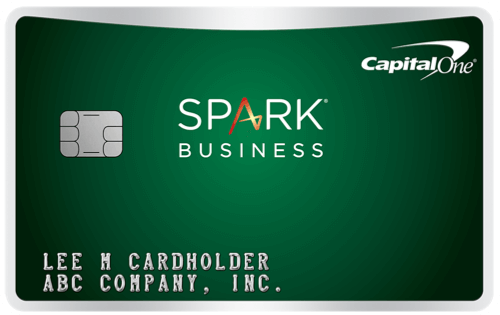
Secured Business Credit Cards
Require an upfront security deposit that is used to determine the credit limit. It is easier to get one of these business credit cards approved and they can help business owners in building their credit history.
- Pros: Accessible option for new businesses with minimal or damaged credit.
- Cons: Upfront deposit and additional fees. They also tend to offer little rewards.
- Good for: New business owners with poor personal credit.
Bank of America’s Business Advantage Unlimited Cash Rewards Secured business credit card is a popular choice for secured cards because of its $0 annual fee, 1.5% cashback on all purchases, and the ability to graduate to the unsecured version after a strong credit history is built up.
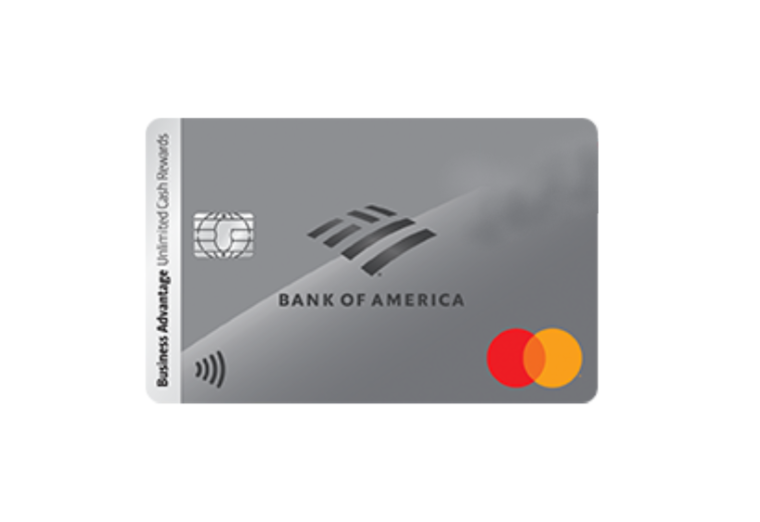
Benefits of Getting a Business Credit Card
A business credit card can be a powerful tool that opens doors for both small and mid-sized businesses. The benefits of obtaining one of these cards go beyond securing funding only and, in this section, we list some of the most relevant advantages of getting one of these credit instruments.
- Build business credit history: Using a business credit card responsibly helps establish a credit profile for your company separate from your personal credit. This can improve your chances of securing financing in the future at better rates.
- Higher limits: Business credit cards tend to come with much higher spending limits compared to personal cards – $30,000 or more is common. This provides flexibility to make large inventory or equipment purchases when needed.
- Improved cash flow: The increased purchasing power of business cards allows you to take advantage of opportunities and discounts when they arise. Many cards also offer an interest-free grace period which gives you extra time to pay.
- Business-focused rewards: The reward programs of business credit cards are tailored to common spending categories like shipping, advertising, gas, restaurants, travel, and more. Some also offer valuable perks like employee cards, concierge service, travel protections, and extended warranties.
- Streamline expenses: Issuing employee cards on your account simplifies expense tracking and reimbursements. Some cards also let you set customized spending limits for each cardholder. Having a business card also makes separating personal and business expenses easy.
Check out credit card expert Brian Jung’s video breakdown to learn more of the hidden benefits of getting a business credit card.
Business Credit Card Best Practices
Getting a business credit card is an important step for any business owner but it is also a responsibility. Make sure that the card is used appropriately to not break your cardmember agreement (or any laws) or harm your business credit.
Here, we outline five of the best practices that business owners may follow to avoid the pitfalls of getting a business credit card.
1. Never make personal expenditures with your business card
One of the main benefits of getting a business credit card is to be able to separate personal from company expenditures. In fact, many credit card companies don’t allow small business owners to use their business cards for personal purchases. If you do, you may be breaking the agreement you made when signing up for the card so just use a personal credit card.
2. Make payments that exceed the minimum
Just like personal credit cards, most business credit cards have a minimum monthly installment that must be paid to stay current. It is typically a good idea to make a monthly payment that exceeds this minimum to reduce interest expenses, make positive contributions to your credit history, and keep your utilization rate low. This helps tremendously when building business credit.
3. Set limits to your employee cards
If you happen to issue separate credit cards to one or more of your employees, make sure that there is a maximum limit to the amount that they can spend with it. This reduces the risk of fraud and keeps your business expenses in check. In addition, it is often a good idea to pay up all of the balance or transfer it to the least expensive credit card each month to reduce interest expenses.
4. Take advantage of all rewards
Your business credit card’s rewards are not free. Hence, if you happen to have access to benefits and perks, make sure you use them and exploit them as much as possible to the benefit of your company.
This includes features like discounts on insurance and travel tickets, access to VIP lounges at airports, and cashback rewards. If you are not fully familiar with how these perks and features work, you can contact a representative of the credit card company to get more information.
The Bottom Line
Business credit cards provide a range of benefits and advantages, from the ability to keep business and personal spending separate to earning rewards on expenditures to establishing a business credit profile.
When exploring your options, scrutinize rewards programs, interest rates, fees, credit limits, and bonus features like employee cards, accounting integration, and travel protections to find the right business credit card for your company.
The application process is usually straightforward, requiring simple business and personal information but make sure to read the fine print to ensure you meet the eligibility requirements. With a tailored business credit card in hand, you can invest in your company’s growth while streamlining expenses and gaining financial flexibility.

